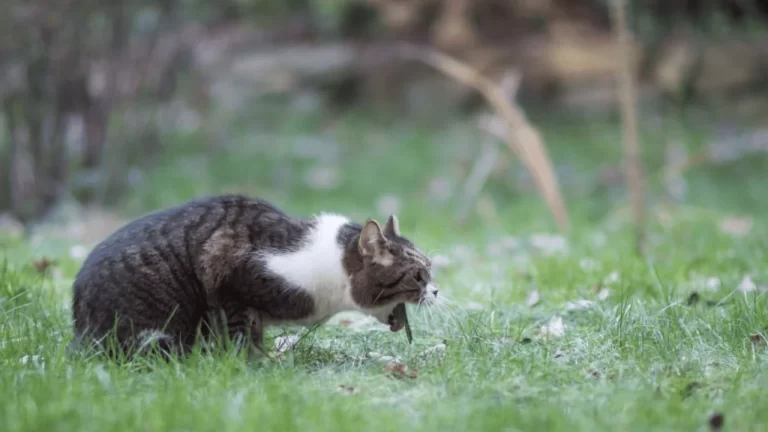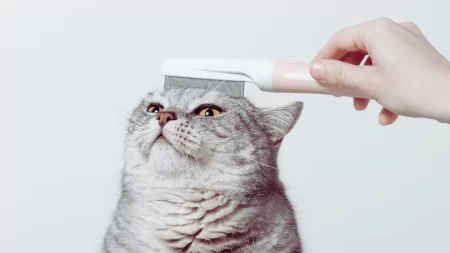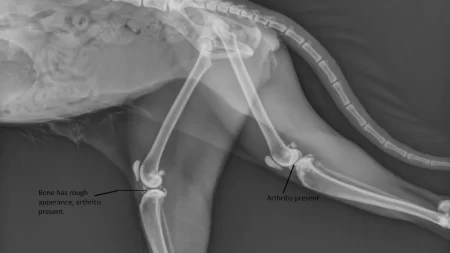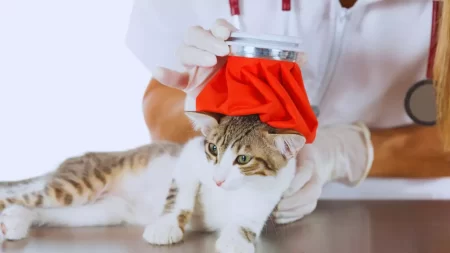Dry heaving, also known as retching, is common in cats and can be caused by a number of issues like hairballs or an upset stomach.
While an occasional episode of dry heaving may not be a cause for concern, chronic or severe heaving can indicate a more serious health problem that requires veterinary attention.
This article will discuss some of the most common causes of cat dry heaving and provide 5 helpful tips for stopping your cat’s retching and keeping them comfortable.
Common Causes of Cat Dry Heaving
Furballs / Hairballs
One of the most frequent triggers for cat dry heaving is hairballs. As diligent self-groomers, cats regularly ingest loose hair. If that hair accumulates into a hairball and passes through the digestive tract, it can cause gagging, retching motions, and vomiting as the body tries to expel it. Hairballs are a common nuisance for cat owners, but frequent episodes can pose a health risk.
Nausea
Like humans, cats can experience nausea and an upset stomach from a variety of causes. Eating spoiled food, having a sensitivity to a particular ingredient, and motion sickness can all prompt nausea and dry heaving in cats. Cats may also retch due to side effects of medication, metabolic diseases, parasites, or as a symptom of anxiety.
Gastroenteritis
Gastroenteritis refers to inflammation of the gastrointestinal tract, typically due to an infection. Feline gastroenteritis is often caused by viral or bacterial infections. Symptoms include vomiting, diarrhea, lethargy, and loss of appetite in addition to dry heaving motions.
Kidney Disease
Cats with kidney disease tend to feel nauseated and experience a loss of appetite. As kidney dysfunction leads to a buildup of toxins in the blood, affected cats frequently show signs of nausea like repetitive gulping motions and retching. Kidney issues can also cause ulcers in the gastrointestinal tract which further aggravate nausea.
Other Serious Conditions
While the above causes are most common, dry heaving can also result from more severe conditions like feline asthma, heart disease, cancer, liver disease, and metabolic disorders like diabetes. It’s important to watch for other symptoms in addition to retching and seek prompt veterinary care if heaving persists.
Tips to Help Stop Cat Dry Heaving
If your cat is experiencing occasional episodes of dry heaving, there are some simple home remedies you can try to help soothe their stomach:
Regularly groom your cat to prevent hairballs
Gently brushing or combing your cat’s coat helps remove loose hair and prevents excessive self-grooming and hair ingestion. Use a stainless steel comb to most effectively catch loose undercoat. Regular brushing also helps you spot potential skin irritations early.
Provide a nutritious diet with plenty of fiber
A diet rich in protein and fiber will help move hair through the digestive tract. Canned pumpkin (not pie filling but 100% pumpkin) is a great way to add more fiber. Gradually transition your cat to a high-quality food if needed. Avoid cheap brands filled with fillers which can aggravate nausea.
Keep toxic substances out of reach
Cats are famously curious and may nibble on houseplants, chemicals, or other unsafe items. Make sure all human medications, cleaners, automotive fluids, and toxic houseplants are kept in secure cabinets. Tin foil around plant pots can also deter curious cats. Ensure trash cans have secure lids, and pick up any dropped pills right away. By cat-proofing your home, you remove one potential source of upset stomach and nausea for your cat. It’s also smart to avoid using air fresheners, candles, or cleaning products around your cat’s main living areas when possible.
Ensure your cat has fresh food and water
Dehydration can quickly lead to a cat feeling unwell. Provide fresh, filtered water daily, and pay attention to any decrease in your cat’s appetite or water intake. Feed wet food to increase moisture intake. Promptly throw away uneaten wet food so it doesn’t spoil.
Schedule regular check-ups with your vet
Your vet can assess your cat’s overall health and determine if dry heaving may be a symptom of a larger issue. Annual exams along with up-to-date vaccines and parasite prevention help spot problems early. Discuss any dietary concerns and ways to minimize hairballs.
When to Seek Veterinary Care for Cat Dry Heaving?
While occasional dry heaving may resolve on its own, it’s important to monitor your cat closely and contact your vet if you notice:
- Chronic or severe symptoms
- Difficulty eating or drinking
- Changes in behavior or appetite
- Signs of lethargy, pain, or distress
- Vomiting for more than 24 hours
- Vomit that contains blood or a strange color
- Weight loss
A persistent or excessive gagging reflex in cats can lead to dehydration, malnutrition, and electrolyte imbalances. So if your cat is showing concerning symptoms along with dry heaving, don’t wait it out. Seek veterinary care right away. Kittens, senior cats, and those with other medical issues are most vulnerable to complications.
In conclusion, monitoring your cat for hairballs, ensuring proper nutrition, and scheduling annual vet checkups are all key steps to stopping dry heaving before it becomes a bigger issue. While an occasional episode is normal, chronic or severe retching needs to be addressed. With prompt care for any underlying cause, your beloved feline companion should be back to their happy, playful self in no time.







